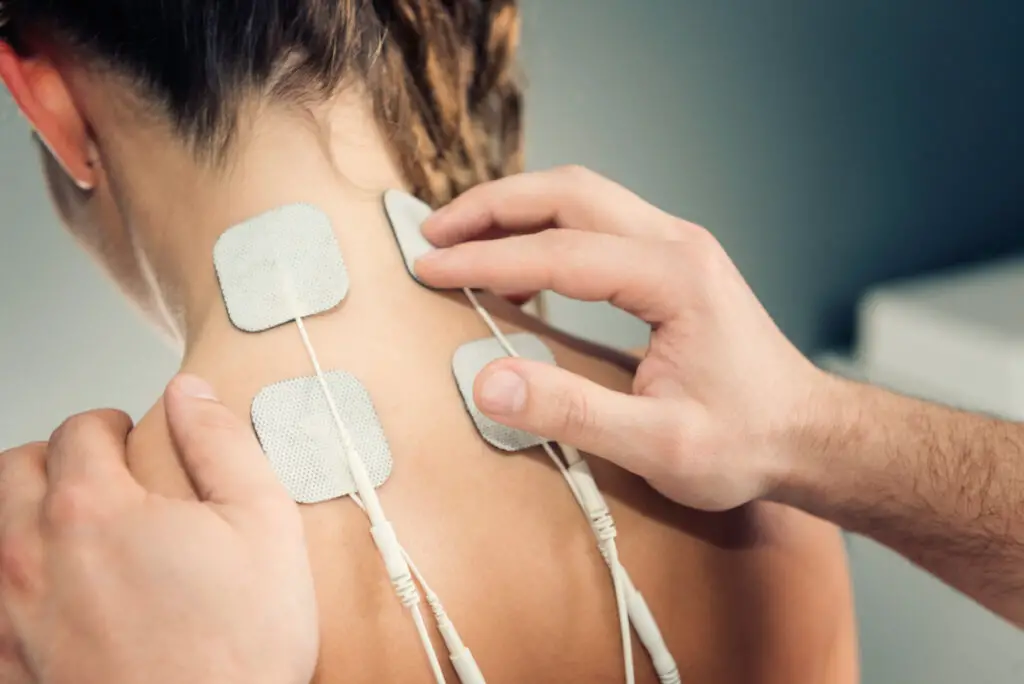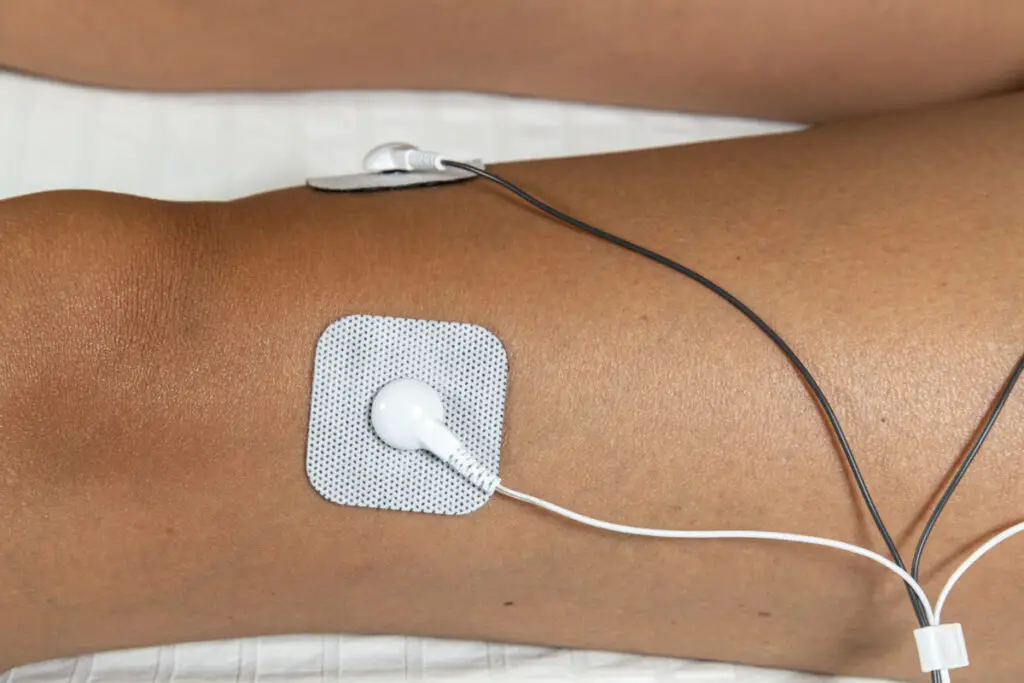If you suffer from persistent pain — whether it’s back pain, period pain, or more persistent pain from a chronic condition — then you’re probably aware that using painkillers to help with your problem comes with the potential of serious side effects!
So, have you ever considered using a TENS unit to help reduce pain? TENS units and other electrotherapy devices are gaining in popularity because these FDA-approved machines work to help those in pain manage their condition more easily.
But what does a TENS unit do? What’s the process of using one?
In this blog post, I will explain Transcutaneous Electrical Nerve Stimulation (TENS) and go over the experience of using a machine so that you won’t have any questions left about whether you might benefit from TENS therapy.
What Does A TENS Unit Do?

If you have acute or chronic pain in your joints, muscles, or nerves (as I do), then using a TENS device can help you to manage this pain. TENS stands for transcutaneous electrical nerve stimulator, and the unit itself does this by sending low-voltage electrical impulses through the skin to send signals to the brain and spinal cord.
The typical TENS unit is a small and battery-operated device with many wires flowing from it. (although these days you can also get hold of wireless TENS devices, as well as disposable options that can be used when traveling). The unit has wires that are connected to sticky pads, also known as electrodes.
The electrodes send a mild electrical current through the body, designed to stimulate muscles and relieve pain.
The result of placing these electrodes on your body is that the muscles around the area in pain are able to relax. This works to help the body produce endorphins, which are the hormones considered to be nature’s painkillers because they block your brain’s perception of pain.
Overall, this will increase your feelings of well-being, and therefore your pain is reduced. Of course, this process will differ from person to person, depending on the severity and length of the pain, as well as their pain threshold.
However, the TENS method works for many (like me), who are encouraged by the fact that they can manage their pain on their own, without the intervention of pharmaceutical painkillers. We all know that painkillers can have potential side effects including addiction and death, and can cause real harm with extended use.
Do TENS Machines Work, Really?

If you ask anyone who has managed to take control of their persistent pain whether or not their TENS unit really works, there is only one answer — and that is a resounding yes!
This is why healthcare professionals the world over have reported that using a TENS unit helps their patients to treat pain in the comfort of their own homes.
However, like anything, how effective a TENS unit actually is at providing complete pain relief will depend on the condition that’s being treated, the type of pain experienced, and the individual using the device
That’s because a TENS unit will not cure the cause of your pain. The electrotherapy machine is only able to give you short-term relief from your condition.
But for most users, it does this very effectively.
a TENS unit will not cure the cause of your pain. The electrotherapy machine is only able to give you short-term relief from your condition.
So, although it is very possible that you will experience some relief from your pain when using an electrotherapy device like a TENS unit, in no way will it actually promote healing of your condition. It is simply to be used to control and manage your pain, and is a method of pain relief.
How Does A TENS Machine Help Pain Relief?
The electrode pads that are placed on the body send electrical pulses to your skin. These pulses tell the nerves in your muscles to send signals to your spinal cord and brain that will help them to relax.
This process creates the potential for endorphins to be released into your bloodstream. These endorphins will trigger a reduction in your stress and pain levels and give you an overall sense of relief from the condition that’s being treated — without pain medications.
Hallelujah!
What Does It Feel Like When You Use TENS Units?
Whenever you use a TENS unit, you will need to place the electrodes on clean and dry skin, making sure that they aren’t crowded and bunched up in the area being treated.
Depending on the type of pain you are experiencing, you’ll place the electrodes in different locations.
Here are a few details:
- Where to Put a TENS Unit for Menstrual Cramps
- TENS Unit Placement for Sciatica
- Does a TENS Unit Relax Muscles?
Begin your session by turning the machine on, making sure that it has been set to the zero intensity setting. You can then increase the setting, finding the pulse intensity that feels comfortable, not painful.
You will basically feel a slight tingling sensation as the electric pulses are sent to your skin from the electrode pads. As you increase the intensity, (if needed) you shouldn’t feel any discomfort, although the tingling may slight increase in strength.
Can A TENS Unit Cause Nerve Damage?
If you use your TENS unit according to the manufacturer’s instructions, then there should be no need to worry about causing any nerve damage to your body.
Something that you will definitely need to consider though, is that using the electrode pads on your face or throat does have the potential of causing damage to your nerves.
This is because the skin on your face is very thin and sensitive, so the electric pulses can damage the nerve endings. This is why it is recommended that you never place the electrode pads anywhere on your face, throat, or neck. In that way, you will avoid any chance of nerve damage from occurring in the first place.
TENS Therapy Benefits: Should You Try TENS Therapy?
Using a TENS unit to manage your pain issue is an effective and safe way of doing so. Of course, if you’re pregnant, have diabetes, cancer, epilepsy, or a heart problem, you should speak to your doctor first to make sure they consider it safe for your condition.
You can use a TENS unit for treating a wide range of pain conditions, including:
- Arthritis (including Rheumatoid arthritis)
- Back pain (including sciatica)
- Joint pain (including the shoulders, elbows, knees, and hips)
- Muscle spasms
- Neck pain (at the back, not the throat or sides)
- Period pain (including endometriosis symptoms)
- Pelvic pain
- Sports injuries
How To Use A TENS Unit

Using a TENS unit is very simple, which is one of the reasons they have become so popular over recent years. All you need to do is make sure the skin where you will place the pads is clean and dry and then apply the electrodes.
With the dial set at zero, you simply turn the TENS unit on, and then increase the setting, making sure that the tingling you feel is only slight, and not uncomfortable.
If you feel pain from the stimulation, then the setting is too high.
If you feel pain from the stimulation, then the setting is too high.
If you still have pain and can handle a stronger sensation, then gradually increase the setting to where it’s comfortable.
Also make sure that you check the skin underneath the electrode pads after every 10 minutes or so, just to be safe, and ensure that your skin isn’t being irritated by the pulsing.
When To Use A TENS Unit
Whenever you’re experiencing pain that you would otherwise take painkillers for, you may want to try reaching for the TENS unit first.
Always follow your manufacturer’s instructions, but it is usually safe for you to use your TENS unit at any time you feel that you need to manage your pain. Many people with chronic conditions use their devices for up to six hours a day for continued pain relief.
However, to begin you can try using your machine for around 15 to 30 minutes, and then giving yourself a break for an hour before using it again, only if needed. For more severe pain, you can use your TENS unit for up to an hour a few times a day, with breaks in between.
It has been reported that a TENS unit can offer up to four hours of pain relief after each session. But everyone is different, so you will find your own rhythm of use, depending on your pain threshold and the severity of your symptoms.
It has been reported that a TENS unit can offer up to four hours of pain relief after each session.
If you find that you’re using it for long stretches, you may want to do discuss that with your doctor.
Can A TENS Unit Hurt You? When Should You Avoid TENS Therapy?
TENS units and other electrotherapy devices like them have been approved by the FDA, because they are generally safe to use for most people, and are very effective at helping them to manage their pain accordingly.
Some people who have very sensitive skin may find that the electrode pads cause skin irritation or burning when using their TENS unit, even at the lowest setting. Fortunately, this is a problem that the manufacturer of TENS is well aware of.
This is why you can purchase electrode pads that have been designed specifically for people who have sensitive skin.
And whenever you use your TENS unit, you should make sure that the skin where you’re placing the pads is clean and dry, and that it isn’t irritated, chapped, dry, broken, open, or infected, otherwise you will be dealing with more damage than before your pain relief session.
It’s also possible you can be allergic to the cleansers used on the pads, so pay attention to any reactions.
Final Thoughts
For many regular users (like me), their TENS units are something of an electric dream. They are able to manage their pain wherever and whenever they need to without taking dangerous painkillers.
So, if you’ve been wondering: what does a TENS unit do, and are considering using this option for helping with your pain management, it may just be worth your while. Follow your manufacturer’s instructions and speak to your doctor if you’re pregnant, have diabetes, cancer, epilepsy, or have a heart problem.





